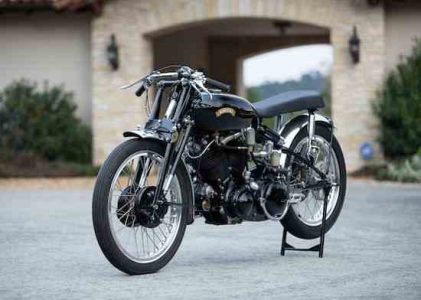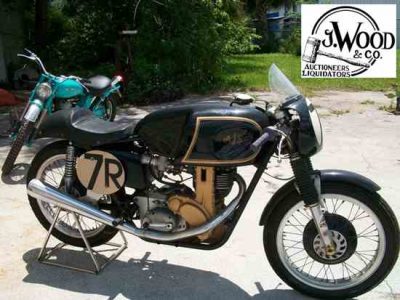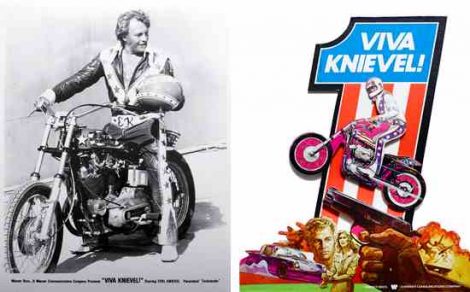A record number of motorcycles flowed through the auction halls in Las Vegas, Nevada, this last January, as Mecum and Bonhams both held their annual sales. But in spite of the greater volume of motorcycles processed, prices were generally firm. Longtime enthusiasts and collectors Robert Smith and Somer Hooker share their observations, with Robert’s report first.
Crockers top Vegas sales
Excluding memorabilia and “road art,” Mecum offered 1,438 lots for sale, selling 1,276, or 89 percent, with a total value of close to $23 million without buyer’s premium. At just under $16,000, average price per lot was generally consistent with Mecum’s performance over the last decade.

A 1939 Crocker “Big Tank” at Mecum took top price at $704,000 (including premium). Runner-up was another Crocker, this time a “Small Tank” from 1937 at $423,500. Top British bike was an early Brough Superior SS100 Alpine Grand Sport from 1925, which fetched $357,500. Of the top 10 selling bikes at Mecum, four were 4-cylinder machines: a 1912 Henderson Model A at $302,500, a 1913 Pierce at $192,500, a 1923 Ace at $176,000 and a 1915 Henderson Model D at $170,500. Top Harley price was $143,000 for a 1928 JDH, and top Indian was a 1905 Camelback at $104,500.

The Crocker Big Tank was part of a consignment of 235 motorcycles from the MC Collection of Stockholm, Sweden. The total sales value of the collection, including premium, was $10.5 million. Eleven other motorcycle collections were being sold, including a consignment from A British Motorcycle Museum in America.

Bonhams also held their motorcycle auction in Las Vegas on Jan. 24. Top price was expected for the ex-Hans Stärkle 1949 Vincent Black Lightning race bike, with over $360,000 anticipated. Bidding stalled at $285,000. One of only 67 built, a “never raced” Ducati Supermono fetched $115,000, while a series C Black Shadow sold for $95,450.

Both Mecum and Bonhams offered examples of Friedel Münch’s monstrous Mammut motorcycle. Mecum’s 1968 4TT fetched $77,000, while Bonhams’ 1974 TTS-E sold for $112,000. Also offered by both auction houses were examples of Laverda’s SFC750 production racers. The Mecum SFC sold for $88,000, while Bonhams’ was bid up to just $30,000 — perhaps because it was missing its homologation tag. (It was reported to have sold later for $38,000.) Two green-frame Ducati 750 Super Sports were on offer at Mecum: One sold for $90,000, while the other — unrestored and with appropriate patina — made $247,500: Restorers beware! Other Ducati and MV Agusta prices were similarly varied: Mike Hailwood Replicas sold from $13,250 to $49,500, and MV Agusta 750s fetched from $49,500 to $137,500. Seven Guzzi singles were on offer at Mecum, and ranged from $8,250 for a 1955 250 Airone to $82,500 for a 1925 CV2 racer. A rare 1931 Sport 15 sold for $55,000.

Two of Dan Smith’s hand-crafted motorcycles — both previously featured in Motorcycle Classics — went under the hammer at Mecum. The 1936 500cc AJS V4 sold for $85,250 while the 1939 Velocette Roarer was unsold at $70,000.

Bargain hunters picked up a 1983 Laverda RGS for $4,400 and a 1975 Moto Morini 3-1/2 Sport for just $3,300.
Trends
I’ve attended the Las Vegas auctions six times out of the last eight years, recording the sale price of as many lots as possible, and compiling them to see if any trends emerge. This can be a challenging exercise; for example, it’s important that a sufficiently large number of lots go under the hammer to make the trend statistically significant. If only a small number of a particular make or model are listed, the sale prices may not be representative. It’s also necessary to correct for motorcycles with significant provenance (the McQueen effect) or a prominent racing history.

So I’ve selected a number of makes and models where the numbers were large enough to have confidence that prices were representative of that class. First, the total number of motorcycles sold at Mecum has more than tripled, from 387 in 2012 to 1,276 this year. In spite of the increased throughput, prices have remained fairly steady, with an average lot sale price around $16,000 without premium.
British twins are the bread and butter of the Mecum auctions with dozens of each brand sold every year. BSA prices have risen recently: Average price of a BSA twin was around $16,000 this year compared to $12,000 in 2012. Norton twins overall held their value, while Triumph twins were down, slipping around 20 percent from $14,000 to $11,300 over the same period.
It was also interesting to compare Triumph twins from different eras; these being 1963-1970 unit construction twins, pre-unit twins, and 1971-1982 oil-in-frame twins. Pre-unit average prices have definitely increased (from around $11,000 in 2012 to over $16,000 this year), while unit construction prices have dropped, by 13 percent to an average of $8,000 over the same period. Oil-in-frame twins were steady at around $5,200 over the same period.

Norton twins prices have climbed slowly overall since 2012, Commandos now averaging $9,000. However, Dominators and the Matchless-framed hybrids sold on average for 50 percent more than Commandos at over $14,000.
Analyzing prices for the two big American brands reveals that while Indian prices have remained flat with an average price in the low-$30,000s, Harley-Davidson prices have ticked up, from the low-$10,000s in 2012 to close to $25,000 in 2019.
It’s reasonable to assume that Honda’s numbers would be representative of Japanese motorcycles in general. Prices have been fairly steady, but sliding from an average of around $8,000 in 2012 to around $7,000 this year. However, the number of units sold almost certainly affected prices, with Mecum selling eight times as many Hondas in 2019 than in 2012 (198 vs 24)! Also noticeable was the large number of smaller Hondas, which may have dragged the average down.
Finally, Italian motorcycle prices have been rising sharply, with the average for MV Agustas breaking $50,000 and Ducatis pushing $30,000.
(Note: These numbers are as recorded at the time, for comparison only, and presented in good faith. Errors may have occurred in calculation. The values shown may not be representative of general market conditions, and should not be used for valuation, pricing, or investment. Your results may vary.)
New interest and new blood

“Who’s going to buy all of those bikes?” was constantly repeated prior to the 2019 Las Vegas sales. Mecum initially announced a six-day sale and then scaled back to five days with over 1,750 motorcycles on offer. Across town Bonhams was doing more of a boutique sale with 150 lots available, including several Steve McQueen-related bikes. The McQueen magic worked again with a 1938 Triumph selling for $155,000.

The highlight of the Mecum sale was an entire collection imported from Sweden, all offered at no reserve. Now collectors would have an opportunity to bid on Broughs, BMWs, Crockers, Ducatis, Husqvarnas and Vincents to name a few at no reserve. Their marketing included a museum-like display of the collection in Las Vegas prior to the sale. A no-reserve auction can sometimes generate a higher price as everyone knows it is a “last man standing” (or paddle) scenario. Auction companies are always glad to broadcast when a vehicle is “in the market.” They know bidders will get a sense of urgency.
Last year we noted a rotation in the market. The same trends continued this year. While the classics did well, there was little growth in their valuations.

The growth came in the interest of what some refer to as the “Modern Classics,” the ’70s, ’80s and ’90s Superbikes. There were fewer Honda RC30s built than Vincent Black Shadows. Some were raced, some were trashed, and some were put away. Last year, clean examples were bumping the $100,000 mark. This year they blew right through it as did the even more limited RC45. Meanwhile the NR750 Honda was looking at the $200,000 ceiling. This year there were four of the 7,400 Honda CB750 sandcasts on offer. Even a tired but very complete example (albeit with a stuck engine) brought $17,000 on the hammer. Remember when a Suzuki GSXR seemed outrageous at $4,000? Try $14,000 now for a crisp example.

Other Japanese Superbikes were also doing well. Japanese offroad bikes and factory motocross bikes were in high demand. Being relatively scarce meant the prices were high. In reality most offroad bikes led a tortured life. Even though some were mass produced they were also massively abused.

Clean original Italian Superbikes were also creating more interest. MV Agustas in pristine condition also jumped into the six-figure club. An MV America went for a new record. A Ducati 750SS went for $245,000, breaking last year’s record of $175,000. The key seems to be clean original paint.
Rarely do Crockers come to market. A few years ago, the E.J. Cole sale sold one for $300,000-plus. This year, four were available, the highlight being a “Big Tank” bringing over $700,000. A “Small Tank” sold for $423,000.
Pre-war BMWs were also on offer. Numerous examples have been coming out of Europe over the years. Low production models always seem to “ring the bell.” An R37, long considered BMW’s first real sport bike sold for $220,000. An R5 did well while an R71 was reasonable. Even an RS54 was sold.
It’s hard to think of one-third of a million dollars being a reasonable price, but a 1925 Brough Superior SS100 with good history was just that. Even more reasonable was a 1952 Vincent Rapide that was fully restored to a high standard for around $39,000. Reasonable is relative.
A final highlight was there were new faces and new money here. Maybe it is a healthy economy or maybe it’s a whole new generation wanting a piece of their past?
New people looking for old bikes never gets old. MC











